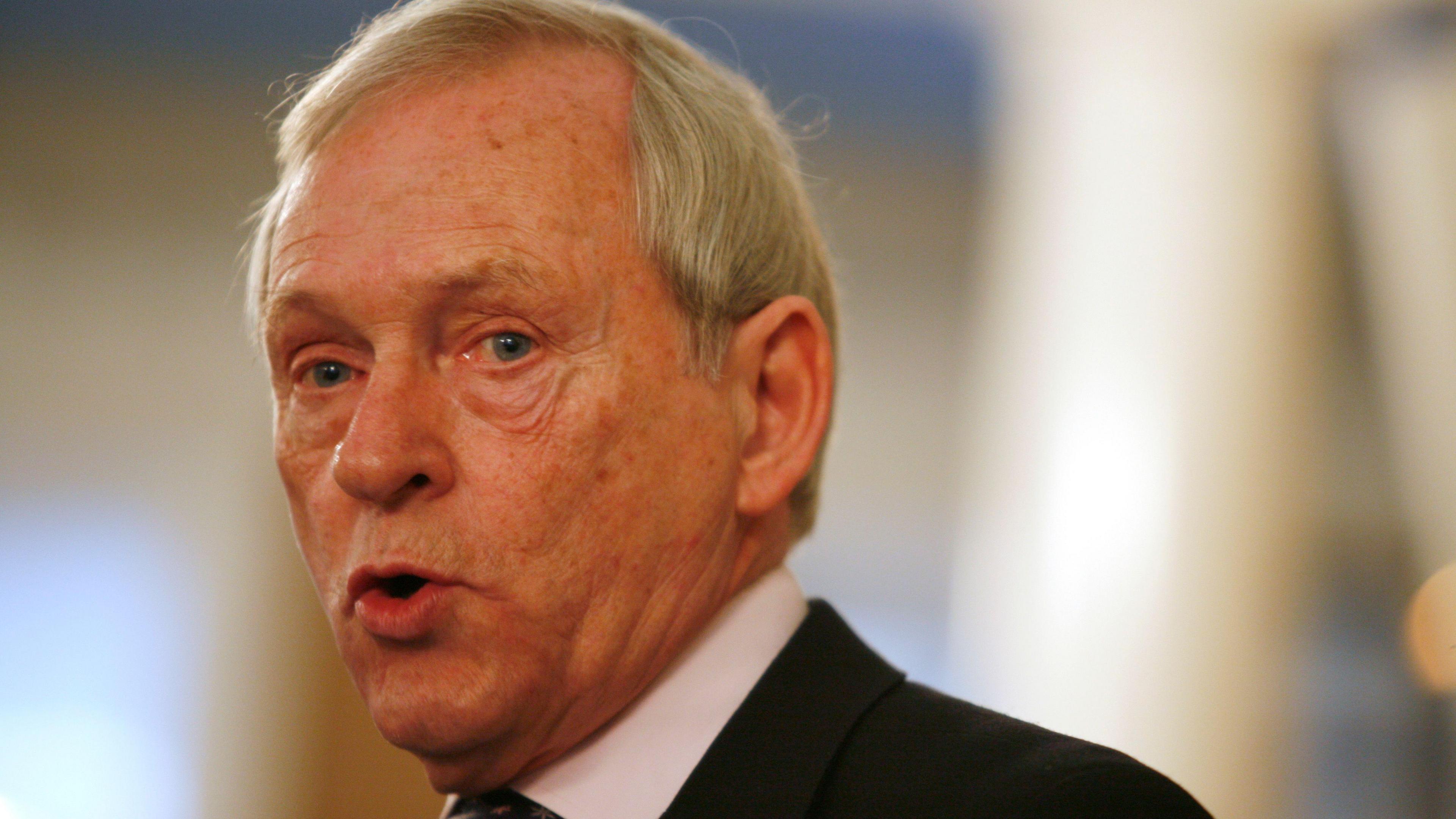Sir George Reid obituary: Respected SNP politician and journalist
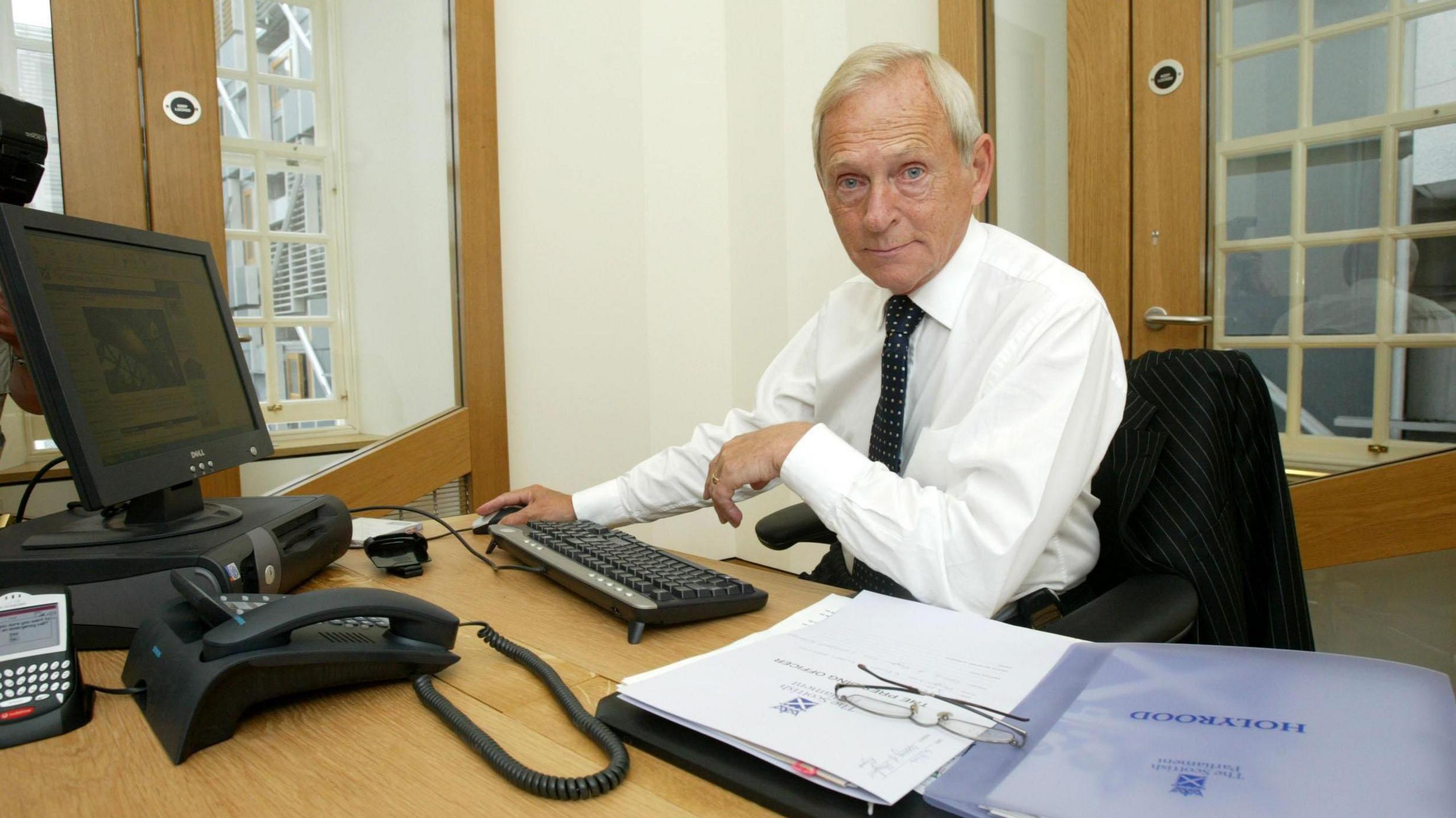
- Published
Sir George Reid, who has died aged 86, enjoyed a long career in and out of politics, in which he managed to be one of the SNP's bright young things and elder statesmen.
In between, he worked as a journalist and television presenter before moving into public affairs with the Red Cross, a job which took him around the world to disaster zones and international emergencies - an experience which influenced his later political career.
After being elected to the Scottish Parliament in 1999 he served as its presiding officer between 2003 and 2007, a period in which he was widely credited with taking control of the Holyrood building project.
It set him up for a final act in public life where he became a visiting academic, an independent reviewer of public bodies, and the Queen's representative to the Church of Scotland.
A member of a political party whose motivating factor is radical change of the British state, his intellect, talent for diplomacy and personal charm made him at once an establishment figure and a politician beloved of the national movement.
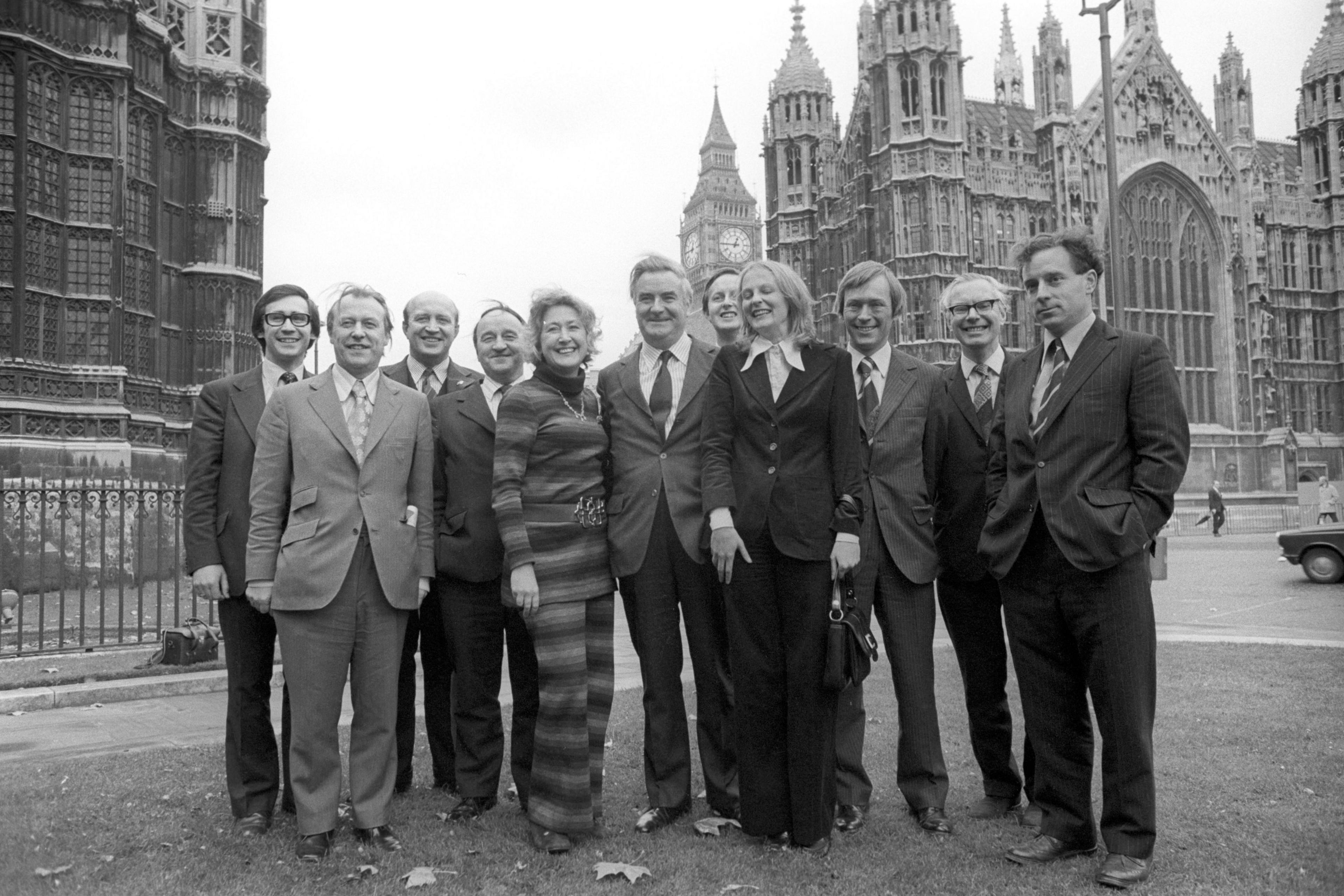
Reid was one of the "first eleven" SNP MPs elected to Westminster in October 1974
George Reid was born in Tullibody in 1939 and educated at the private Dollar Academy.
From there he read history at the University of St Andrews before further study in Switzerland and the US, an early example of the internationalism and interest in foreign affairs which would inform his political outlook.
He went into journalism in newspapers and entered broadcasting as the industry enjoyed its first flourish in Scotland, working for the BBC as well as Grampian and Scottish Television.
A respected operator, he moved between news programmes and current affairs documentaries but was not content to be an observer of his nation's politics. In February 1974 he was elected to Westminster as the MP for Clackmannan and East Stirlingshire, one of six new SNP members.
That was a crucial election for his party. It was a time of economic and political crisis towards the end of Ted Heath's Conservative government and the SNP built its campaign around the motto "It's Scotland's Oil".
It paid off. The seven MPs elected went south to sit in opposition to Harold Wilson's new minority Labour government, which lasted just eight months before having to go to the country again.
The October 1974 result became a transformative moment in the SNP's history. Reid was re-elected, this time one of the "first eleven" MPs.
They were a small though voluble band of MPs and Reid used his time at Westminster to develop his links with politicians across Europe. He was also something of a media star, a smart and articulate performer who was valued by programme makers and his party.
The first half of his political career came to an end in the 1979 election which saw Margaret Thatcher come to power. That group of SNP MPs would forever be criticised for voting against the Labour government in the confidence vote which triggered the election.
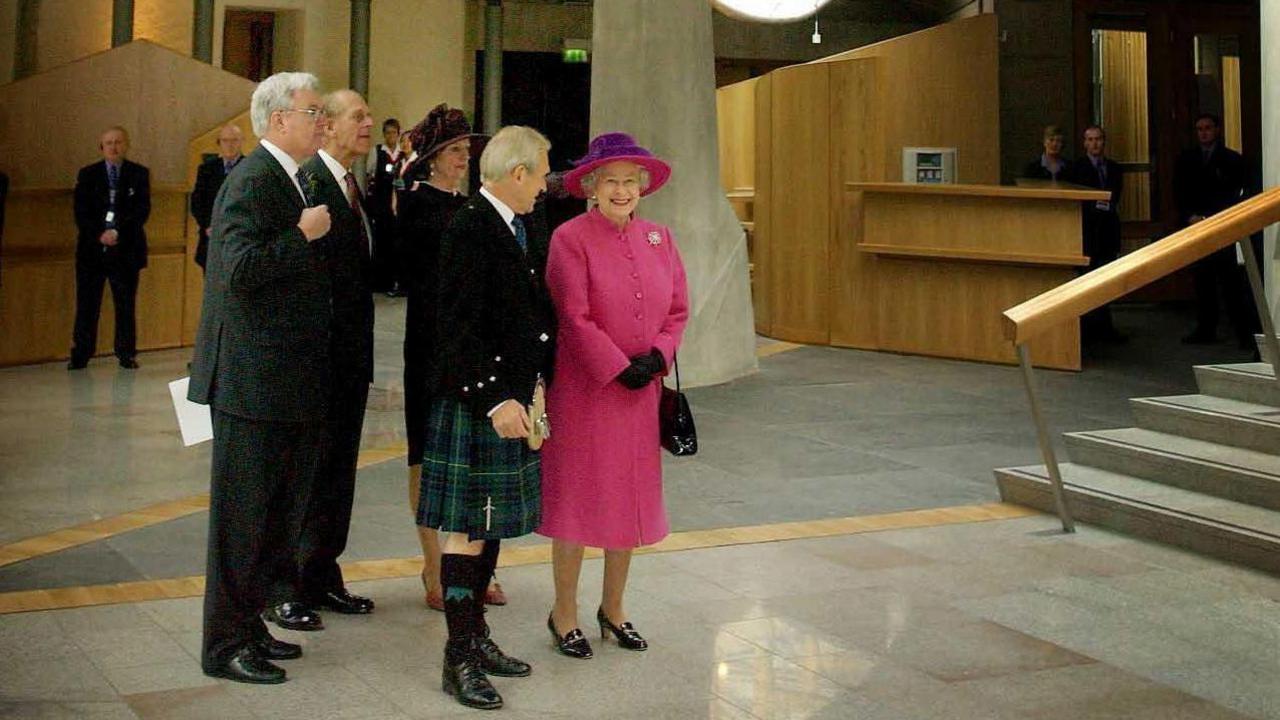
Reid led the opening of the Scottish Parliament building at Holyrood in 2004
The 1980s saw Reid returning to journalism, presenting political programmes for BBC Scotland. He worked on coverage of the famine in Africa, a job which led to him joining aid organisation the International Red Cross.
Based in Geneva, he spent the next period travelling the world working on emergency relief projects.
A public speech in 1995 was seen by many as return to Scottish politics, though his Donaldson Lecture drew deeply on his knowledge of European politics. He stood once again for his former constituency in 1997 but was unsuccessful.
In 1999, and approaching his 60th birthday, he was once again elected to parliament - this time in Edinburgh. He threw his hat in the ring to become the Scottish Parliament's first presiding officer, losing to Sir David Steel.
But he was made a deputy presiding officer, holding the post through the parliament's difficult first few years.
The biggest problem throughout that period was the Holyrood building project, which after a controversial selection process quickly spiralled out of control with a delivery date forever moving away into the distance and a budget which just kept on getting bigger and bigger.
When Reid took over from Steel in 2003, he made a huge effort to get on top of what had become a national embarrassment.
He demanded regular reports and updated the parliament with the same regularity. He was filmed and photographed in hard hat and tabard walking the media through the building, explaining the issues and identifying solutions.
And he was the front of house man when it finally opened in 2004. His speech on that day struck a hopeful note, saying Scotland could now be more confident in the institution.
He said it was now a country where "if we make mistakes they are our mistakes, and we can no longer blame anyone else".
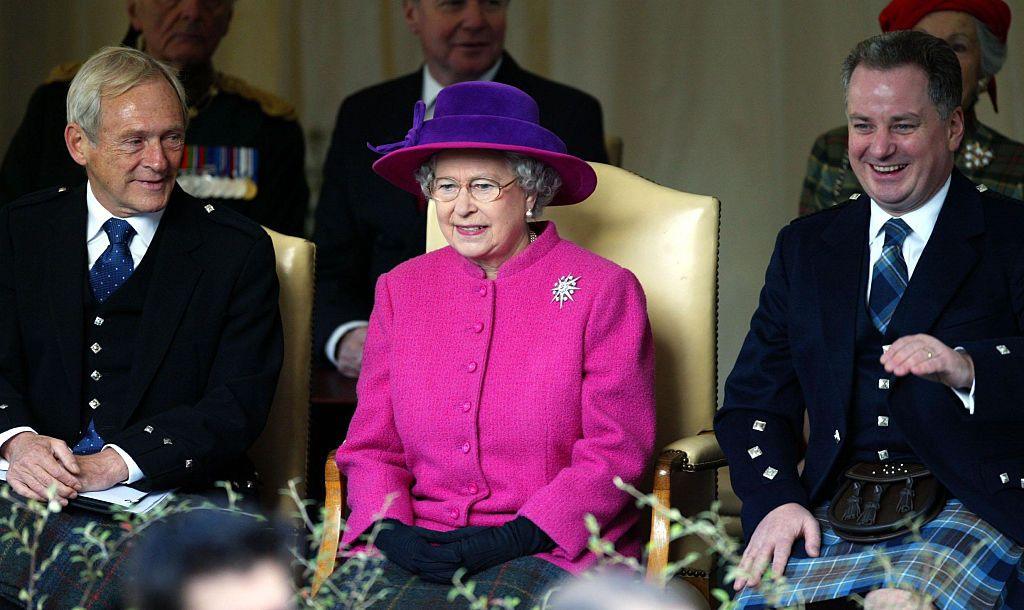
Reid became something of an elder statesman in his later career
After leaving the parliament at the end of his term in 2007, he became a sought-after figure in politics outside Scotland.
He was chosen to lead a review of the Northern Ireland Assembly. His report called for reform of the way Stormont was run, including greater autonomy for the assembly and its civil servants.
In 2008 he became the Lord High Commissioner to the General Assembly of the Church of Scotland, making him the monarch's representative on the Mound.
He would go on to review the governance of the National Trust for Scotland, delivering a report which was used to radically reshape the body after years of criticism of its performance and structures.
By his seventies he had certainly become that elder statesman figure and was knighted - an unusual thing for an SNP figure - in 2012. Ten years later he was appointed a Knight of the Order of the Thistle, the most senior order of chivalry in Scotland.
After a period of ill health in 2013, he remained until recently a cogent commentator with a quick mind and wit.
Popular with journalists and his fellow nationalists, he enjoyed a good public image and was still in demand in the media and on the political platform.
Paying tribute to his late colleague Winnie Ewing in 2023, he addressed the SNP's Independence Convention in Dundee about the importance of politics as a vocation.
"Don't make excuses, make improvements," he said. "Do things with the people of Scotland, not to the people.
"Concentrate on those who are still to be convinced. Keep right on to the end of the road."
Those words for his former colleague will probably do for him too.
Related topics
- Published13 August
